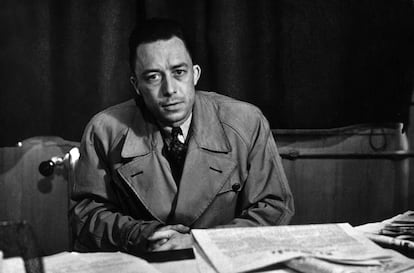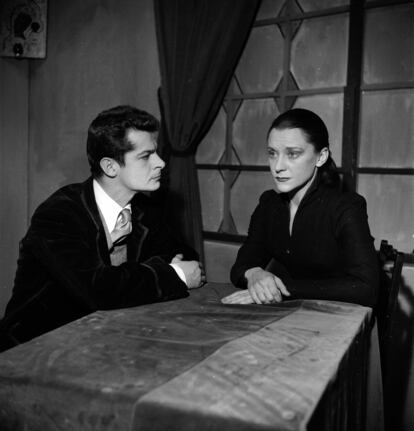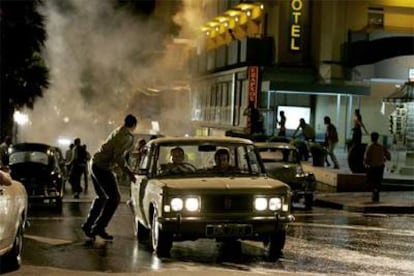Albert Camus and Gaza: ‘Even in destruction there is an order, and there are limits’
The French Nobel Prize winner’s play ‘The Just Assassins’ and Steven Spielberg’s movie ‘Munich’ reflect on how violence and revenge end up consuming those who exercise it

Albert Camus, the 1957 Nobel Prize winner in Literature and one of the writers of the 20th century who has left the deepest mark on the 21st, premiered The Just Assassins in 1949. Inspired by real events, the play tells the story of a group of terrorists who want to attack the Russian Grand Duke. Two of them, the idealists Dora and Kaliayev, are in love, but willing to give up everything— their love, their life— for a higher cause: the hope of bringing freedom and justice to the Russian people. But the French playwright and novelist knew how to introduce in one short text all the contradictions and dilemmas of political violence, even when one is defending a just cause.
When the float with the duke and duchess passes by, Kaliayev is unable to throw the bomb because two children are also on it—a dilemma that Brian De Palma copied in a key scene from Scarface, when Tony Montana refuses to kill a politician because he has his children in the car. And that leads to the most important scene of the play, which pits Dora and Kaliayev against the fanatic Stepan, who defends that any death is justified by a higher cause. These are some excerpts from this crucial moment.

“Kaliayev: If you decide that those children must be killed, I will wait until the theater exits and I will throw the bomb on the float alone. I know I won't fail. Decide and I will obey the organization.
Stepan: The organization had ordered you to kill the Grand Duke.
Kaliayev: That’s true, but it hadn’t asked me to murder children.
Dora: Open your eyes and understand that the organization would lose all its power and influence if it tolerated, for a single moment, children being destroyed by our bombs.
Stepan: I don't have enough heart for such trifles. When we decide to forget those children, that day, we will be the owners of the world and the revolution will triumph.
Foka: That day the revolution will be hated by all humanity.
Dora: Yanek’s ready to kill the Grand Duke because his death may help to bring nearer the time when Russian children will no longer die of hunger. That in itself is none too easy for him. But the death of the Grand Duke’s niece and nephew won’t prevent any child from dying of hunger. Even in destruction there is an order – and there are limits.
It is inevitable to think about this scene during these days of horror in Israel and Gaza. As it is inevitable to remember the film Munich by Steven Spielberg, perhaps the most courageous and complex movie by the American director. It was released in 2005, in the midst of George W. Bush’s war on terror, during which the U.S. Administration engaged in massive human rights violations following the terrorist attacks of September 11, 2001 and just as the invasion of Iraq, based on lies, had devolved into a disaster.

In Munich, Spielberg, who based the movie on a script co-written by Eric Roth and Tony Kushner, tells the story of how Israel, under the government of Golda Meir, orders a group of Mossad agents to kill the masterminds behind the massacre of the Israeli team at the 1972 Olympic Games in Munich. The film reflects on revenge and leaves in the air the idea that, when a country breaks its own laws to defend a just cause, it ends up being consumed by that contradiction.
When she launches the command, Golda Meir’s character states: “Every civilization finds it necessary to negotiate compromises with its own values.” But, at the end of the film, the person in charge of the operation maintains: “Every man we’ve killed has been replaced by worse! There is no peace at the end of this, no matter what you think. And you know it’s true.” The last scene — a spoiler alert is probably unnecessary for a film released nearly 20 years ago — shows the Twin Towers among the skyscrapers of southern Manhattan, alluding to the fact that revenge did not stop terrorism, rather the contrary, it only contributed to destroying the values that those who started it believed they were defending.
Sign up for our weekly newsletter to get more English-language news coverage from EL PAÍS USA Edition
Tu suscripción se está usando en otro dispositivo
¿Quieres añadir otro usuario a tu suscripción?
Si continúas leyendo en este dispositivo, no se podrá leer en el otro.
FlechaTu suscripción se está usando en otro dispositivo y solo puedes acceder a EL PAÍS desde un dispositivo a la vez.
Si quieres compartir tu cuenta, cambia tu suscripción a la modalidad Premium, así podrás añadir otro usuario. Cada uno accederá con su propia cuenta de email, lo que os permitirá personalizar vuestra experiencia en EL PAÍS.
¿Tienes una suscripción de empresa? Accede aquí para contratar más cuentas.
En el caso de no saber quién está usando tu cuenta, te recomendamos cambiar tu contraseña aquí.
Si decides continuar compartiendo tu cuenta, este mensaje se mostrará en tu dispositivo y en el de la otra persona que está usando tu cuenta de forma indefinida, afectando a tu experiencia de lectura. Puedes consultar aquí los términos y condiciones de la suscripción digital.









































